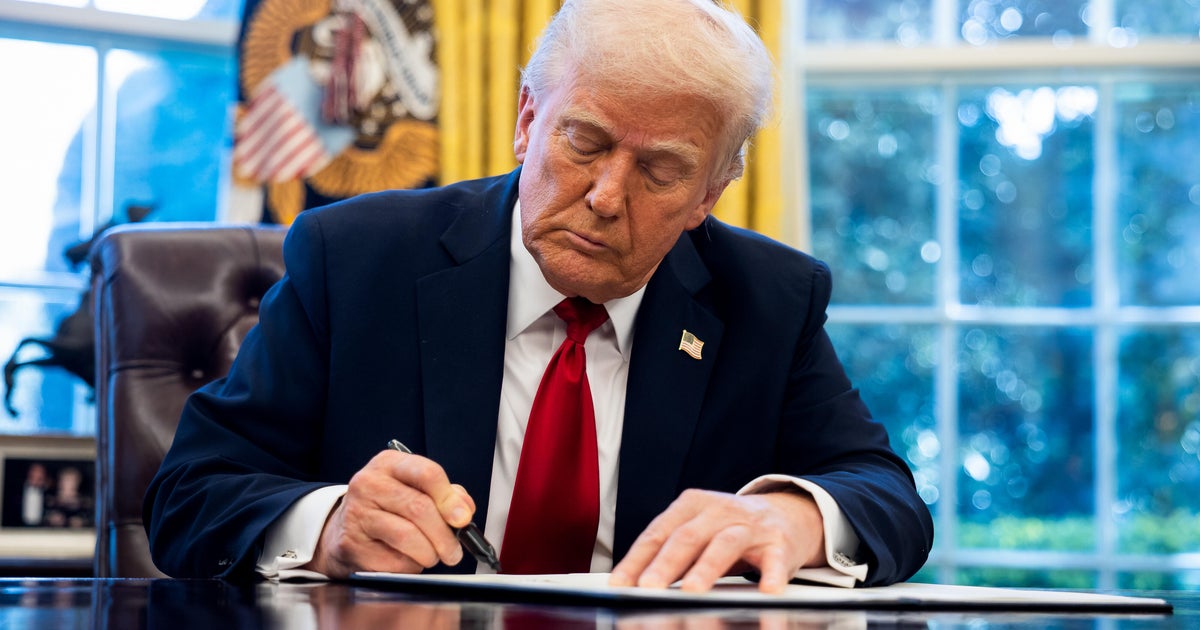Trump orders limited strike on Iran but then calls it off
Washington -- President Trump on Thursday ordered the U.S. military to conduct a limited strike against Iran to retaliate for the downing of a Navy surveillance drone in the Persian Gulf region, but he then called off the operation just an hour before it was to begin. The president's change of course avoided, for now, what would have been the most significant escalation of hostilities between Washington and Tehran in decades.
There was every indication the U.S. was about to launch a limited strike against Iranian surface-to-air missile sites on Thursday evening, but the military stood down at the 11th hour. More than one source confirmed this to CBS News, including two sources within the Trump administration who were familiar with the president's decision. The sources said the plan was already underway when it was called off.
The operation was halted just one hour before it was to begin, sources have told CBS News.
"It was a go, and then it wasn't," one official said. Another said simply: "cold feet."
Two sources told "Face the Nation" moderator Margaret Brennan on Friday that concerns expressed to the Trump administration by allies were at least one factor in the decision to call off the strike.
Russia, China, and major European allies including France, Germany and Britain have tried to keep the nuclear deal with Iran, which Mr. Trump pulled the U.S. out of last year, viable. They all favor a diplomatic resolution to the current crisis.
"We don't believe escalation would be in any party's interest and continue to talk to the U.S. and our partners," a spokeswoman for U.K. Prime Minister Theresa May said Friday, according to the Reuters news agency.
Germany's government also welcomed the decision not to strike Iran. Chancellor Angela Merkel's spokesperson Martina Fietz said, "regarding President Trump, I can say that there are numerous statements and indications that the American president would like to avoid a military confrontation and we naturally welcome that."
Iran has warned that it will breach the limit imposed by the 2015 nuclear agreement on its stockpile of enriched uranium next Thursday, unless those other global powers find a way to keep the deal in place by continuing to do business with the Islamic Republic. If they go over the enriched uranium limit as threatened, the diplomatic deal with those countries will officially unravel. Brennan notes that any U.S. military strike on Iran would make it harder for Tehran to back down on its enrichment threat.
The New York Times first reported that Mr. Trump approved the strike and then pulled back before it was carried out.
The Pentagon announced earlier on Thursday that a U.S. drone flying above international waters in the Strait of Hormuz had been shot down by an Iranian surface-to-air missile system on Wednesday night. The Trump administration denounced the downing as an "unprovoked attack," while the government in Tehran accused the U.S. of being the aggressor and said the drone was flying in Iranian airspace.
Iran stuck to its line on Friday morning, claiming "indisputable" evidence that the U.S. spy drone had violated its airspace. A commander from Iran's Revolutionary Guards, which the U.S. accuses of attacking the drone, claimed on Friday that his forces decided not to shoot down a manned U.S. spy plane that had accompanied the drone.
Iran's state-run Tasnim news agency quoted Amirali Hajizadeh, head of the Guards aerospace division,
as saying "there was also an American P-8 plane with 35 people on board. This plane also entered our
airspace and we could have shot it down, but we did not." The P-8 Poseiden is a surveillance and attack aircraft flown by the U.S. Navy, often in conjunction with the Navy's version of the American drone that was shot down by Iran.
The U.S. military has said no American aircraft entered Iranian airspace at all on the day the missile hit the drone. There was no immediate U.S. military comment on the claim that a Poseiden was flying with the Global Hawk shot down this week.
Deputy Iranian foreign minister Abbas Araghchi told the Swiss ambassador, whose country represents U.S. interests in Iran, that Tehran had collected wreckage from the Global Hawk "from Iran's territorial waters." He said Iranian would present its evidence to the United Nations.
On Friday, Iran's state-run television showed video of what the regime claimed were pieces of the downed drone. CBS News could not immediately identify the debris as parts of a Global Hawk drone. An explosives expert with specialist knowledge of military drones told CBS News, however, that the fragments shown by Iran could well be from a drone, and that some of the debris bears markings indicative of an explosion.
Although the president suggested the drone had been shot down by "mistake," he nevertheless warned that the U.S. would respond to any belligerent moves by Tehran.
"This country will not stand for it," Mr. Trump told reporters at the White House before convening an emergency meeting with Republican and Democratic leaders in Congress.
House Speaker Nancy Pelosi, who met with the president, urged him to obtain congressional authorization to use any kind of military force. She said she couldn't predict whether the president would consult Congress before taking military action, but did note that lawmakers had the opportunity to share their thoughts with the administration Thursday. She also said the president told them they would have more meetings about the issue.
The discussion on Thursday within the Trump administration on whether to take retaliatory military action represents the latest flash-point in nearly 40 years of geopolitical enmity between both countries that began after the U.S.-allied monarchy was overthrown during the Iranian Revolution in 1979.
The strained relationship entered a détente of sorts under the Obama administration, which allied with European countries to broker a landmark deal with Iran to reduce its medium-enriched uranium stockpile in exchange for the lifting of economic sanctions, but it has worsened since Mr. Trump took office.
Although America's European allies are still abiding by it, Mr. Trump withdrew the U.S. from the agreement, dubbed the "Iran nuclear deal," in May 2018, deriding it as a one-sided deal. He has also imposed crippling sanctions on Iran.
Mounting tension in recent weeks has raised fears that a full-blown conflict could ensue between the countries as hardliners in both Tehran and Washington escalate their rhetoric.
Earlier in the month, the Trump administration accused the Iranian government of attacking two oil tankers in the Gulf of Oman, a vital waterway near the Arabian Peninsula for international oil shipments. Officials said U.S. intelligence suggested the Islamic Revolutionary Guard Corps — an elite military unit which answers directly to Supreme Leader Ayatollah Ali Khamenei — was behind the attacks.




